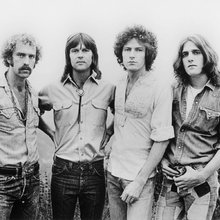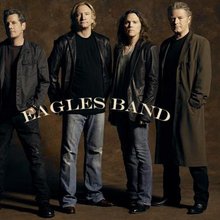The Eagles were formed in 1971 by guitarist/singer Glenn Frey, drummer/singer Don Henley, guitarist/singer Bernie Leadon, and bassist/singer Randy Meisner. The initial idea was Frey's; when signed to Asylum by David Geffen, he was advised to form a group - and he did. He had been hired by Linda Ronstadt and her manager John Boylan to get together a group to back Ronstadt on tour. With an eye towards his future band, he approached Henley to be her drummer. With Boylan's help, Frey was also able to interest Leadon and Meisner, two other members of her touring band. In 1971, they played together for the first time at Disneyland, backing Ronstadt. They gelled so well that before long, the four guys were in Geffen's offices with Leadon asking the fateful question: "Do you want us or don't you?"
Geffen signed them and hooked them up with famous producer Glyn Johns to record their first album Eagles (1972), which was done in London in less than three weeks. Johns guided them towards a country-rock sound that they would become famous for, producing the hits Take It Easy, Peaceful Easy Feeling, and Witchy Woman.
Their second album Desperado (1973) was less successful, but artistically strong - a concept "rockers as outlaws" album that was ahead of its time. It was their third album On the Border(1974), however, that produced their first number one hit: Best of My Love. That song would start a trend of number ones over the next six years. It was also during the making of On the Borderwhen the Eagles switched producers from Johns to Bill Szymczyk, who gave them more freedom in their approach and was open to making the albums more "rocking." A "late addition" to the album was guitarist Don Felder, who joined the group officially after the album was released.
One of These Nights (1975) garnered them their first Grammy for the song Lyin' Eyes and the title track was their next number-one hit. Take It to the Limit from the album was their first gold record. The songwriting, especially in the cases of Frey and Henley, was growing in sophistication. Nevertheless, Leadon had become disenchanted with the Eagles lifestyle, dissatisfied with the direction they were taking, and disgusted with his treatment by his fellow bandmates. He left and was replaced by renowned ex-James Gang guitarist Joe Walsh.
With Walsh on board, the group moved even closer to a hard rock sound with Hotel California (1976). They hit paydirt. The album was a massive success, second only to Fleetwood Mac'sRumours as the highest selling album of its time. It was a concept album detailing the dark desperation felt by those who had lived out their every decadent fantasy and still remained unsatisfied. With its inspired vocals, brilliant musicianship, and pop-culture appeal, it spawned hit after hit after hit and guaranteed them a place in music history.
Unfortunately, the decadence of Hotel California was being enacted by the band in their every day lives. Their "third encore" parties after shows became infamous carnivals of sex, drugs, and booze. The substance abuse did not make the tensions in the studio and on the road go away; in some ways, it exacerbated them. Egos that had always been at odds were now on their way to a Battle Royal. Meisner left at the end of the tour, not wanting to deal with it anymore.
As a replacement, the Eagles brought in Timothy B. Schmit who, like Meisner, used to play bass for Poco. They began work on The Long Run (1979). The huge pressure on them to match and even outpace Hotel California made the already-clashing egos hyper-sensitive as well. The music-making process became an ordeal rather than a joy. Frey was especially miserable, and started to consider breaking up the band. He made the final decision to do so at a 1980 benefit show in Long Beach for Senator Alan Cranston. When Don Felder declared at a press conference prior to the show that he didn't care a thing about Cranston and had just showed up to play, Frey was embarrassed and infuriated. They exchanged threats during the show and then afterwards, got into a physical fight which ended with Felder swinging a guitar at Frey before running off at top speed.
That was it for Frey. He didn't even want to rejoin the band to mix the tracks for the Live album (1980), Fed-Ex-ing his parts to the studio instead. He called Henley and told him that he wanted to do his own thing for a while... and that was it. The Eagles were over. Or so everyone thought...
Then, in 1993, the Eagles got back together to appear in Travis Tritt's video for his cover of Take It Easy. Unlike an attempt to get the Eagles back together that had occurred in 1990, this one took. They "resumed" with Hell Freezes Over (1994), making a best-selling video as well as a live album. Their tour made more money than anyone had anticipated. The Eagles were back on the map.
When the tour ended in 1996, many wondered if the Eagles were also once again over. The next time they appeared, it was to be inducted into the Rock'n'Roll Hall of Fame in 1998. All seven Eagles past and present performed. In 1999, the Eagles made plans to play several "Millennium" shows at the turn of the century. They recorded the shows and released them as part of a Selected Works Box Set (2000), which they would tour to promote.
After the Millennium shows, however, Don Felder was fired over a disagreement about money. He sued. The Eagles reached a settlement with Felder in 2007.
Still able to draw stadium-sized crowds, the Eagles continued to tour without Felder off and on. They released a single Hole in the World from their Very Best of the Eagles (2003) album, and then launched their "Farewell 1" tour to promote it. This led to the filming of one of the tour's shows for release on DVD, Farewell 1: Live in Melbourne (2005).
In 2007, the Eagles put out a new studio album, their first in 28 years, called Long Road Out of Eden. It debuted at #1 on the charts, further proving the Eagles' enduring appeal. Additionally, the Eagles were critically recognized when "I Dreamed There Was No War" won a Grammy for "Best Pop Instrumental Performance." The band toured to support the album for several years, not only touring the typical stops but also places they had never been before such as South Africa, Dubai, and China. It was truly a world-wide endeavor.
Their next project was a documentary entitled The History of the Eagles, released in 2013. This documentary, produced by Alex Gibney and directed by Alison Ellwood, covers the band's career from its earliest days to the year of release. It includes interviews with all members of the Eagles, past and present, as well as several of the people who worked with them and influenced them. Incorporating previously unreleased archival footage of live material and behind-the-scenes moments, it proves a treasure trove to fans interested in peeking into the past.
The Eagles are currently touring to promote the documentary and, to the delight of hardcore and casual fans alike, have included Bernie Leadon. Never say never when it comes to the Eagles!
Band Line-ups
1971-1974
Glenn Frey, Don Henley, Bernie Leadon, Randy Meisner
1974-1976
Glenn Frey, Don Henley, Bernie Leadon, Randy Meisner, Don Felder
1976-1977
Glenn Frey, Don Henley, Randy Meisner, Don Felder, Joe Walsh
1977-1980; 1994-2000
Glenn Frey, Don Henley, Don Felder, Joe Walsh, Timothy B. Schmit
2001-present
Glenn Frey, Don Henley, Joe Walsh, Timothy B. Schmit

